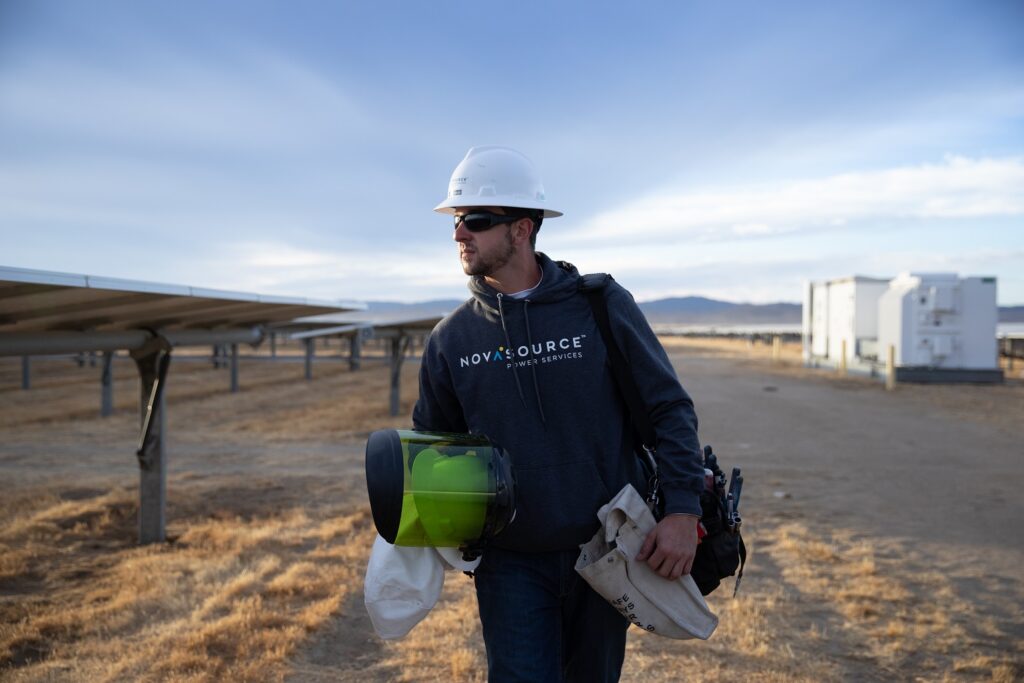
It’s time the battery storage industry adopted an approach to servicing like the model widely adopted by the global solar PV industry, writes Robb Wilson of NovaSource Power Services.
The global market for battery energy storage system (BESS) technology is set to change in a major way. New battery storage is coming online at an ever-accelerating rate and the importance of properly servicing and maintaining it will be crucial to our future energy system.
Enjoy 12 months of exclusive analysis
- Regular insight and analysis of the industry’s biggest developments
- In-depth interviews with the industry’s leading figures
- Annual digital subscription to the PV Tech Power journal
- Discounts on Solar Media’s portfolio of events, in-person and virtual
At present, a majority of preventative maintenance and monitoring services are performed by integrators themselves.
This is proving to be an issue, as the primary focus of these equipment sellers will be their largest revenue driver: equipment sales. And for the foreseeable future, demand will strongly outpace supply, meaning that even when equipment may not perform well, it will likely find buyers – further removing the motivation of equipment sellers to prioritise service.
However, in order to ensure optimal performance of PV-plus-storage installations, the service side of the operation should be left in the hands of those who focus solely on just that, service.
This is extremely important, as the growth of the solar industry relies on the continued performance of these installations. Not only will sub-par performance hinder individual plants, but it can erode the perceived value proposition of investors and operators looking to construct similar solar-plus-storage installations.
Instead, to ensure better performance across the industry, BESS servicing should follow the path of O&M in the solar PV market – by shifting over to those focused solely on service.
Instead of plant operators simply trusting battery integrators to provide the best service in an area that they aren’t necessarily focused on, they should be asking: “Who can provide the most valuable service and has a proven track record?”.
When looking at performance figures, it is becoming abundantly clear what kind of partner can ensure the most reliable energy returns over the long term.
Specialists can apply servicing know-how at portfolio level
Moving to a service focused partner to maintain BESS brings a number of clear advantages that can unlock a new level of performance and reliability for a plant – advantages that are even more pronounced when applied to an entire portfolio of assets.
Moving to an independent service partner means working with someone familiar with the full scope of the plant – understanding the intricacies of the points of interconnect, and how each component works together.
Independent service providers who specialise in this also have access to more plant data, allowing them to better leverage that data to increase performance and alleviate issues before they occur.
It is also important to realise that the market for BESS is still in its infancy – meaning identifying and aligning with experienced partners is especially important. Although it is clear that the market will scale and become a significant part of the renewable energy landscape, experienced service teams are still few and far between.
Power to transform the energy sector
Thankfully, some of the issues that are currently holding back the BESS market are set to subside in the coming years. One of those barriers is the current supply constraints in the battery industry as a whole.
According to analysis firm Wood Mackenzie Power & Renewables, only 4% of the global battery cell production for 2022 is committed to BESS.
Another barrier is the fact that utility scale BESS sites are still not functioning to their full potential.
Thankfully, these two issues can work themselves out concurrently. As the understanding around BESS grows, the economic benefits of committing more battery cells to solar plants will become clearer – this makes it ever more important for these plants to be serviced by experienced teams that specialise on these plants.
Again, Wood Mackenzie gives reason to be optimistic, estimating that 172GW/630GWh of BESS will be installed between 2021 and 2031.
At NovaSource, we view BESS as an important pillar of the energy system of the future, and have thus placed an early focus on the technology. Becoming a leading provider of BESS servicing will allow us to leverage data to move the industry as a whole forward.
It is an exciting time to be in the renewable energy space, and the convergence of multiple technologies should allow for significant progress in moving towards a net-zero energy system.
BESS has the power to transform solar PV into a far more valuable and useful power source – I’m looking forward to helping these plants perform to their highest potential over the coming decade.
About the Author
Robb Wilson is the Director of Pre-COD and BESS Products and Services at NovaSource Power Services. Robb has more than a decade of experience in solar PV O&M and is currently focused on working on solutions to better integrate battery systems into solar plants.

